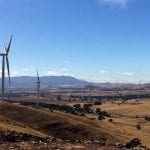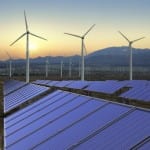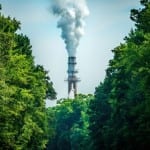Around The Web
Canavan ridicules climate health report, days after climate health expert wins Liberal safe seat
 Canavan dismisses Queensland government report on climate impacts as "imaginary threats of a climate induced drug outbreak."
Canavan dismisses Queensland government report on climate impacts as "imaginary threats of a climate induced drug outbreak."
The post Canavan ridicules climate health report, days after climate health expert wins Liberal safe seat appeared first on RenewEconomy.
Urgent greenhouse gas removal plan could see UK hit 'net zero' target – report
Tree-planting, restoring wetlands and use of chemicals to remove CO2 from air needed, as well as cutting new emissions, say scientists
Tree-planting, restoring wetlands and using chemicals to take carbon dioxide from the air will all be needed to reduce the UK’s greenhouse gases in line with government plans, scientists have said.
If these measures are taken urgently, they could make enough of a contribution to make the UK “net zero” in terms of carbon emissions by 2050. However, a major programme to bring them into effect would be needed as a matter of urgency.
Continue reading...Climate change activists defy Trump’s inaction with their own summit
Leaders of US states, cities and businesses will convene in San Francisco to fight environment crisis, and rebuke Trump’s stance
Senior figures representing US states, cities and businesses rebelling against Donald Trump’s denial of climate change are swarming San Francisco this week to proclaim their own efforts to meet US commitments to cut greenhouse gases.
The two-day Global Climate Action Summit beginning Thursday will also feature diplomats and mayors from around the world. As well, chief executives of Fortune 500 companies and celebrities ranging from actor Harrison Ford to primatologist Jane Goodall all plan to be there.
Continue reading...California locked in to carbon-free power by 2045
 New law commits state of California to 100 per cent carbon-free power by 2045.
New law commits state of California to 100 per cent carbon-free power by 2045.
The post California locked in to carbon-free power by 2045 appeared first on RenewEconomy.
Drought could cut NSW winter crop production by almost 50%, report warns
Rainfall forecasts also suggest ‘limited’ prospects for summer crops
Crippling drought conditions in eastern Australia are expected to wipe millions of tonnes off winter crop production this year and rainfall forecasts suggest “limited” prospects for summer crops, a new report has warned.
On Tuesday a report from the federal agricultural department revealed the winter crop production in New South Wales would be almost cut in half on the year before.
Continue reading...Victoria renewables auction points to another fall in wind and solar costs
 Victoria is not releasing price details of Australia's largest renewable energy auction, but there is enough information to point to another significant fall in the cost of wind and solar.
Victoria is not releasing price details of Australia's largest renewable energy auction, but there is enough information to point to another significant fall in the cost of wind and solar.
The post Victoria renewables auction points to another fall in wind and solar costs appeared first on RenewEconomy.
100th Approved Solar Retailer making it easier for Aussies to chose a quality solar power system
 The Clean Energy Council is proud to announce DICE Australia as our 100th Approved Solar Retailer, highlighting the growth of a program which has now helped tens of thousands of Australians choose a reputable solar company.
The Clean Energy Council is proud to announce DICE Australia as our 100th Approved Solar Retailer, highlighting the growth of a program which has now helped tens of thousands of Australians choose a reputable solar company.
The post 100th Approved Solar Retailer making it easier for Aussies to chose a quality solar power system appeared first on RenewEconomy.
Global fossil fuel demand to peak in 2023, as wind and solar surge
 Carbon Tracker predicts rapid growth of wind and solar will cause fossil fuel demand to peak in 2023 and then plummet, risking trillions for unwary and ignorant investors.
Carbon Tracker predicts rapid growth of wind and solar will cause fossil fuel demand to peak in 2023 and then plummet, risking trillions for unwary and ignorant investors.
The post Global fossil fuel demand to peak in 2023, as wind and solar surge appeared first on RenewEconomy.
GCAS: California working out final elements of Ontario WCI exit, not seeking reimbursement for stray allowances
Australian “low-carbon heroes” recognised amid federal climate policy vacuum
 RenewEconomy's Giles Parkinson named alongside GFG Alliance’s Sanjeev Gupta, climate policy pioneer Simon Corbell and community energy champion Nicky Ison, in 350.org list of more than 30 low-carbon heroes.
RenewEconomy's Giles Parkinson named alongside GFG Alliance’s Sanjeev Gupta, climate policy pioneer Simon Corbell and community energy champion Nicky Ison, in 350.org list of more than 30 low-carbon heroes.
The post Australian “low-carbon heroes” recognised amid federal climate policy vacuum appeared first on RenewEconomy.
'Nature-based' greenhouse gas removal to limit UK climate change
The secret life of fungi: Ten fascinating facts
New edible mushrooms among thousands of recently discovered fungi
Fungi are vital to life on Earth but little studied – new species of mould were found on baby-carrier backpack and an oil painting
New species of porcini, chanterelle and portobello mushrooms were among 2,000 new species of fungi discovered in 2017, which scientists say shows how little is known about the organisms.
More than £30bn of edible fungi are sold each year, according to the State of the World’s Fungi report published on Wednesday by scientists at the Royal Botanic Gardens Kew in the UK. But the lifeforms are even more vital to plants – 90% rely on fungi to thrive – and many human medicines such as penicillin derive from fungi.
Continue reading...Gove hails plans to reward UK farmers for adopting green policies
Payments under EU’s CAP will be replaced by subsidies based on environmental protections
The UK’s biggest landowners will see the payments they receive from the public purse fall sharply from 2021 in what would be the biggest shake-up of farming for decades.
From 2021, a new system rewarding farmers for the public goods they provide will be phased in until 2027 when the last payments based on the amount of land farmed will be made. In place of the £3bn a year farmers currently receive under the EU’s common agricultural policy (CAP), farmers will be expected to sign environmental land management contracts detailing their commitments to protecting habitats, improving flood management and enhancing air and water quality.
Continue reading...Environmental groups sue Ontario over cancellation of cap-and-trade programme
Google searches reveal where people are most concerned about climate change
EPA admits scrapping regulations will put more methane into atmosphere
- Obama-era rules targeted climate change gas from oil wells
- EPA: move ‘may degrade air quality and adversely affect health’
The Trump administration moved closer on Tuesday to rolling back Obama-era rules reducing oil and gas industry leaks of methane gas.
Related: Jerry Brown: Trump's 'gross ignorance' main obstacle in climate change fight
Continue reading...GCAS: California’s Brown pitches broader carbon pricing cooperation, slams Trump US methane policy
How much does it cost to power an electric car around Australia? $150
Retired farmer Sylvia Wilson’s husband died before they could do their dream road trip. She decided to go anyway
Sylvia Wilson drove around Australia in an electric car. It cost her $150.90.
Wilson, 70, a retired farmer from near Biloela in central Queensland, had planned the trip of a lifetime with her husband, Rod. One impulsive evening in mid-2016 they went online and, sight-unseen, bought a Tesla S75 electric car for the journey.
Continue reading...Air, Land & Sea: the 50 greatest wildlife photographs – in pictures
National Geographic has created the 50 greatest wildlife photographs exhibition. A pop-up, which starts its global debut in Melbourne zoo’s historic Carousel Park, the Air, Land & Sea exhibition showcases the world’s best wildlife photography from the likes of Paul Nicklen, Beverly Joubert and Steve Winter
Continue reading...


